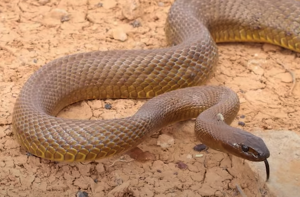 A Queensland man bitten by a taipan snake developed unusual endocrine complications of hypogonadism and gynaecomastia, according to clinicians in Cairns.
A Queensland man bitten by a taipan snake developed unusual endocrine complications of hypogonadism and gynaecomastia, according to clinicians in Cairns.
The 69-year-old man showed rapidly evolving hypogonadal symptoms that developed two months after he presented to a small hospital in remote Queensland with life-threatening envenomation following a bite on the ankle by a taipan.
The man was treated with antivenom but remained critically ill with respiratory failure and shock that required intubation and ventilation and he was evacuated by air ambulance to a tertiary hospital for ICU treatment.
He remained critically ill for a month with the usual complications of taipan envenomation that included neurotoxicity, venom-induced consumption coagulopathy (VICC) and acute kidney injury. He made a gradual recovery and was discharged after five weeks in ICU where he underwent mechanical ventilation and haemodialysis.
However his treating doctors observed on follow up that the man developed severe, rapidly evolving, tender bilateral gynaecomastia over the next four weeks. His pituitary function was normal but his levels of testosterone (6.7 nmol/L luteinising hormone (32 U/L) and follicle stimulating hormone (61 U/L ) were consistent with primary hypogonadism.
Ultrasound showed bilateral testicular atrophy but no vascular pathology, nor any other abnormality. The symptoms continued to evolve and repeat testing of his hormone levels remained persistently abnormal at three months follow up.
Endocrinological review could not find another explanation for his presentation.
Describing the case in the journal Toxicon, the doctors said it appeared to be a unique case of hypogonadism related to snakebite. There had been previous reports of endocrine complications after snakebite, but these were usually patients who presented years later with the classic syndrome of delayed hypopituitarism.
They speculated that the man’s striking hypogonadism immediately after a snakebite might be related to thrombotic microangiopathy (TMA) and macroangiopathic haemolytic anaemia (MAHA).
“The case highlights that although acute taipan envenomation carries significant morbidity and even mortality, taipan-associated MAHA and TMA remain underappreciated,” they wrote.